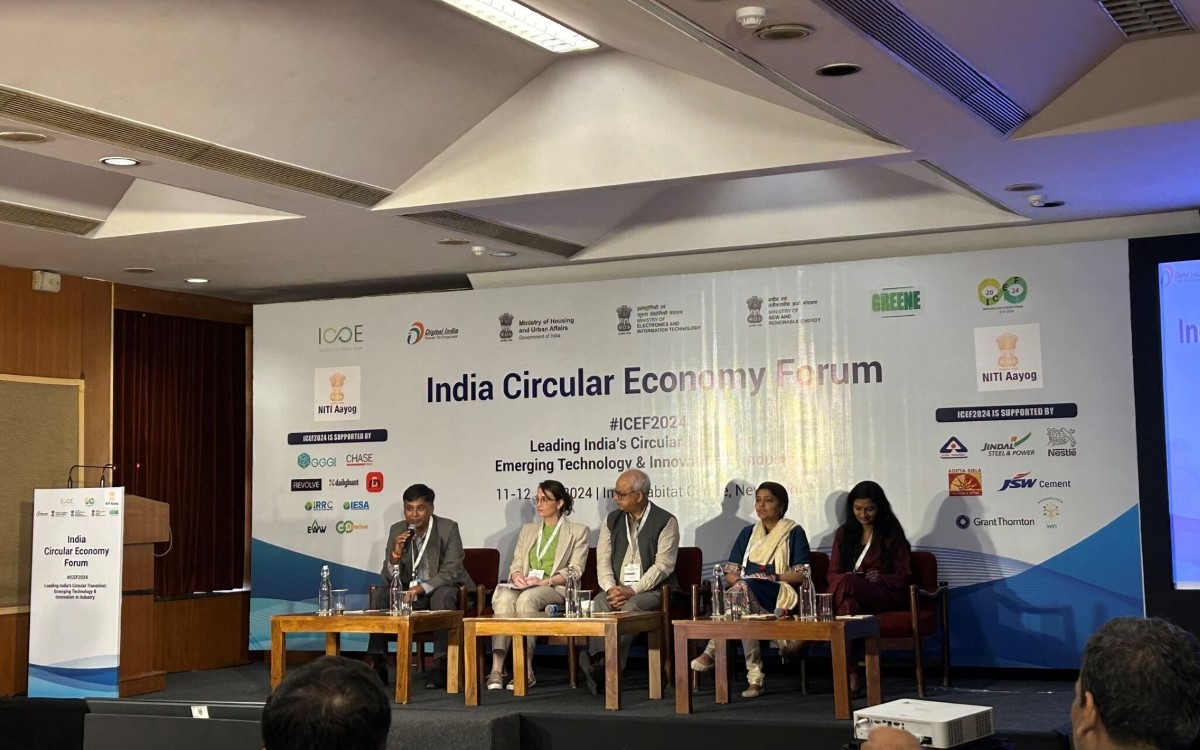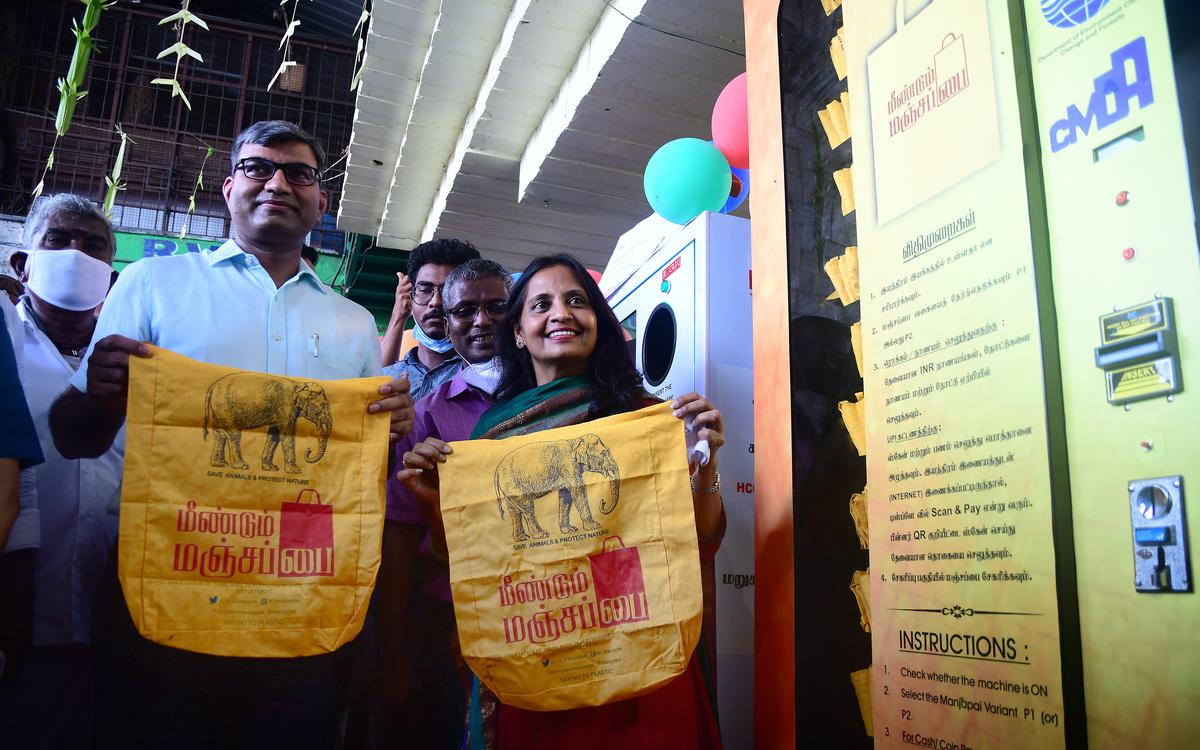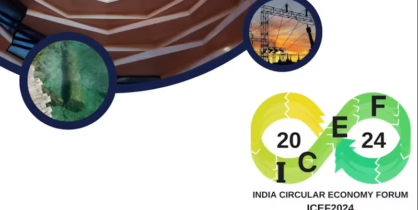India’s Innovation and Technology Landscape for a Circular Economy
The 2024 Indian Circular Economy Forum in Delhi highlighted innovative solutions and policy advancements for India’s transition to circularity.
The 3rd edition of the Indian Circular Economy Forum (ICEF) 2024, organized by the International Council for Circular Economy (IC-CE), sought to bridge the gap between knowledge, awareness and implementation of innovations and technology-based solutions for a Circular Economy (CE). Held in New Delhi, the capital city of India, the forum was attended by nearly 500 delegates and featured over 70 speakers from both the private and government sectors. They discussed how innovative, technology-based solutions can and must become a part of India’s circular economy (CE) story, the role of government policy, and emerging areas for the future.

The Circular Economy Gap Report 2024 estimates in 2023 that the global economy was only 7.2% circular, a number that has declined from 9.1% in 2018. At the same time, a UN report published in March 2024 forecasts that the extraction of raw materials from the environment will increase by almost 60% from 2020 to 2060.
The world of CE has seen continuous evolution in terms of policy landscape in recent years, for example the EU’s Carbon Border Adjustment Mechanism (CBAM). There have also been other developments in terms of innovative and technology-based solutions. Countries like India today face a critical challenge in adjusting to these evolving and dynamic realities. In her opening plenary address, Ms. Shalini Goyal Bhalla, Managing Director of the International Council for Circular Economy, along with other speakers representing the steel, urban affairs, coal, and textiles industries, underscored that with a growing economy, population, a vibrant startup ecosystem, and increased government policy focus, India is poised to contribute significantly to the global circular economy (CE) story. However, the gap and scope to do more remains.
Circularity and Business
Across sectors from coal, steel and other industries, technologies like coal gasification, surface miners, CCUS, 3D printing, Refused Derived Fuel (RDF), plastic Multilayer Packaging (MLP) etc. are seeing greater adoption of circular solutions. For example, Mr Sanjay Khajuria from Nestle presented how across its value chains of food and dairy, the company has launched numerous initiatives to promote solutions such as bio-digesters, carbon sequestering and others.
From a business perspective, the two R’s-Reduce and Reuse-were an important theme at the forum this year. While technology-based solutions continue to rise, for greater adoption across the value chain, from MSMEs to large companies, addressing these two pillars becomes critical. A case in point as highlighted by Mr Sanjeev Singh and Mr Naveen Ahlawat from Jindal Steel & Power Limited was that while the steel industry today deploys more circular processes of production, the challenge for achieving circularity remains in increasing the efficiency of these tech-based solutions and creating value in the co-products associated with adopting more circular processes.
The cost of inaction is going to be greater than the cost of action.
In the aspect of efficiency, value and cost-effectiveness are critical for MSMEs to move towards a CE approach. Neha Vyas from the World Bank pointed out that MSMEs and their involvement are critical to the CE story. Globally, as the UN notes, MSMEs constitute 50% of GDP worldwide, and for India the percentage share of export of MSME-related products in All India Export stood at 43.59% in 2022-23.
While tech-based solutions were a key part of discussions at the forum, innovative nature-based and community-based initiatives that focus on the informal economy were also highlighted. Experts from organizations working on innovative initiatives at the intersection of the informal economy and CE shared their experiences at ICEF. These included Ms. Neha Upadhyaya from Guna Organics on ecovillages, Mr. Manuj Kumar from Lakshya Foundation, Mr. Akshay Gunteti from Green Worms , and Mr. Ramveer Tanwar from SayEarth on water and water bodies. These experts spoke on the importance of the inclusion of people in the informal sector and at the lowest level of the supply chain as being pivotal for a successful and inclusive CE.
The State and Circularity
The government is a key stakeholder in advancing CE in any country. This was also highlighted in the cases of the Netherlands, Finland and Norway who had government representatives at the forum. From setting standards to policy support, insights from ICEF across panels and accelerator sessions underscored the importance of government policy as a key driver for advancing CE in India and the world.
Mr. Amit Verma, Director at NITI Aayog, an apex public policy think tank of the Government of India, highlighted that since 2021, the Ministry of Environment, Forest and Climate Change (MoEFCC) and NITI Aayog have identified 11 priority areas for a circular economy. The last few years have seen the introduction of policies and rules across sectors like Plastic Waste Management Rules, e-Waste Management Rules etc. Other policy tools also include – Production Linked Incentive (PLI) schemes, R&D support, technology upgradation, capacity building initiatives etc.

A crucial sentiment echoed by many stakeholders is the need for continuous dialogue and consultation between government and industries at all levels for greater uptake of policy initiatives and compliance with rules. The panel on quality and compliance pointed out that for technology-based solutions, it is essential for national frameworks being developed across sectors currently to be as easy to implement as possible. It is important that frameworks align with the international context and India’s domestic industry. Mr. Garuav Dolwani from LICO Materials gave an example of recycling of critical minerals from e-waste, where the government needs to have a continuously evolving and dynamic approach in setting policies, given the changing international landscape of importing raw materials.
Emerging Areas for Circular Economy
This year, ICEF focused on broadening the discussion and including critical sectors that have often been overlooked in the CE debate. These include water, urbanization, and industries like textiles.
Textile waste from the fashion industry is the 3rd largest contributor to municipal waste in India. Mr. Shrinivas Naik from Arvind Limited, Mr. Abrar from Syaahi Uniforms and Mr. Chander Kant from Trident Group India pointed out that the scope for circular solutions for the industry such as the usage of sewage-treated water for textile processing, and use of organic fibers like bamboo in product design for reuse is immense.
At this crucial juncture across sectors, India is at a pivotal moment for integrating a CE approach in its growing economy. Solutions and initiatives discussed at ICEF 2024 signify this growing shift and the opportunities that lie ahead. Addressing the challenges of reusability, increasing efficiency and creating value is pivotal for the scaling up and adoption of innovative and tech-based solutions in traditional and emerging areas. Otherwise, as Mr. Abrar remarked in the concluding panel of the forum “The cost of inaction is going to be greater than the cost of action.”


